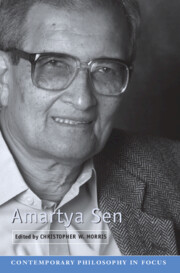Book contents
- Frontmatter
- Contents
- Contributors
- Preface
- Introduction
- 1 Preference, Choice, and Rationality
- 2 Ethics and Economics
- 3 Capability and Agency
- 4 Freedom in the Spirit of Sen
- 5 Social Choice Theory and the Informational Basis Approach
- 6 Sen on Sufficiency, Priority, and Equality
- 7 Famine, Poverty, and Property Rights
- 8 Development
- Selected Bibliography
- Index
- References
5 - Social Choice Theory and the Informational Basis Approach
Published online by Cambridge University Press: 05 June 2012
- Frontmatter
- Contents
- Contributors
- Preface
- Introduction
- 1 Preference, Choice, and Rationality
- 2 Ethics and Economics
- 3 Capability and Agency
- 4 Freedom in the Spirit of Sen
- 5 Social Choice Theory and the Informational Basis Approach
- 6 Sen on Sufficiency, Priority, and Equality
- 7 Famine, Poverty, and Property Rights
- 8 Development
- Selected Bibliography
- Index
- References
Summary
INTRODUCTION
Social choice theory is concerned with the principles underlying choice and preference when a group of individuals have different preferences over the options available. In the sense that it is thought desirable to reflect individual preferences in a group preference, social choice theory deals with the principles of aggregation of preference. At this general level, social choice theory is applicable to decision making by committees, the political voting process, and most aspects of welfare economics.
In narrower terms, social choice theory is concerned with the formal analysis of the aggregation of information to generate a social choice or preference. The basic building block for this theory is the work of Kenneth Arrow (1951); the generalization to permit an understanding of how the aggregation of information is sensitive to the nature of information available is because of Amartya Sen, most notably in his book Collective Choice and Social Welfare (Sen 1970a). This book remains a tour de force in terms of being both a map to guide researchers and an inspiration to them in their endeavors. Indeed, the flowering of the subject in the 1970s and later is directly from the clarity of the issues that Sen laid out in that book.
The purpose of this chapter is to critically examine the informational basis approach to social choice as developed by Sen.
- Type
- Chapter
- Information
- Amartya Sen , pp. 115 - 137Publisher: Cambridge University PressPrint publication year: 2009
References
- 1
- Cited by

